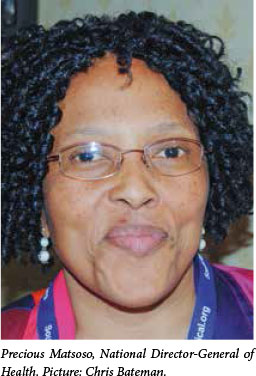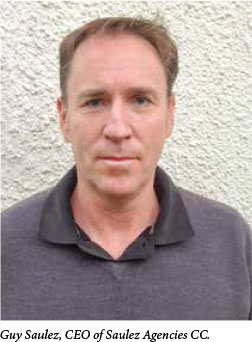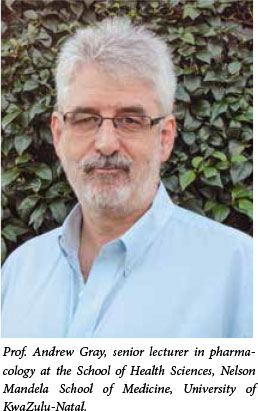Serviços Personalizados
Artigo
Indicadores
Links relacionados
-
 Citado por Google
Citado por Google -
 Similares em Google
Similares em Google
Compartilhar
SAMJ: South African Medical Journal
versão On-line ISSN 2078-5135
versão impressa ISSN 0256-9574
SAMJ, S. Afr. med. j. vol.104 no.6 Pretoria Jun. 2014
IZINDABA
Eastern Cape illegal immune-booster given 'false' approval - officials suspended
An official in the Medicines Control Council (MCC)'s national law enforcement inspectorate and a Port Elizabeth district health manager have been suspended following an illegal trial of an unregistered Californian-manufactured 'immune-boosting' spray on public sector clinic patients.
This was confirmed to Izindaba by both Ms Precious Matsoso, National Director-General of Health, and the Registrar of the Medicines Control Council (MCC), Ms Mandisa Hela, who added that the local importers/distributors of Immutides Spray, Saulez Agencies CC, also face potential criminal charges.
A consignment of the spray, with an estimated value of nearly R1.4 million, was effectively impounded by the MCC four days before a second Eastern Cape health department-'sanctioned' 1 March 'trial' involving 90 HIV/tuberculosis (TB) patients at the three main TB hospitals in the province was due to begin. The national health leadership duo rejected earnest claims by Saulez Agencies CC CEO Guy Saulez that he had met every application criterion pertaining at the time and merely followed official advice. Saulez said he took an MCC law enforcement 'permission to sell' document at face value and described a partially completed trial of Immutides Spray, plus the aborted prospective trial, as 'case studies, not medical trials'. Matsoso, herself a former MCC Registrar, said that any research involving medicines needed MCC approval (which Hela confirmed had not been sought). Hela reiterated that Saulez Agencies' application for registration of Immutides as a complementary medicine had been turned down by both an MCC complementary medicines committee and an MCC veterinary committee, both citing 'genuine safety concerns'. She said the data collection sheets for Immutides Spray used at the Nelson Mandela Region's primary health clinics made it a clinical trial, emphasising that 'we don't know what the protocol of the trial was, or even who the principal investigators were'. The first trial, at several municipal health clinics over a protracted period, preceded by several months a directive from the recently appointed Nelson Mandela Region's District Health Manager, Dr Lulekwa Mayekiso. Mayekiso ordered all senior managers involved in caring for patients in the province's three TB hospitals to dispense the spray to all patients - and issue scripts for it on discharge from hospital. Her edict, effective from 1 March this year, included a provision that the roll-out include the compilation and evaluation of a 'research report' on Immutides. This project was halted four days before it was due to start after the Treatment Action Campaign (TAC) was tipped off by a concerned healthcare practitioner and fired off letters to the top provincial and national regulatory authorities. Eastern Cape Director-General of Health Dr Thobile Mbengashe confirmed that Mayekiso had been suspended on full pay in terms of the Public Service Act pending a disciplinary enquiry, expected to be complete by June. Mbengashe, who was head of the national HIV/AIDS department before taking his current post in September 2013, said the enquiry would focus only on the directive Mayekiso issued in the face of an unregistered, unproven drug that had no ethical approval. The other provincial officials involved were not part of the enquiry, but he would not rule out that they might be. 'The MCC and the NDoH [National Department of Health] have their own probes - we're going with the strongest evidence we have.' He said that neither Mrs Nomalanga Makwedini, at the time Eastern Cape Director-General for Clinical Management Services, nor Dr Francois Fourie, in charge of primary healthcare clinics in the Nelson Mandela Bay district, had 'ordered anyone to use the drugs'.

While Izindaba has, independently of the MCC, established that the 'immune-boosting' Immutides Spray remains scientifically unproven, its distributor says he met every requirement health officials threw at him - and obtained what he thought was official permission to sell it. Documents supplied to Izindaba by Saulez, who admits having distributed the spray to thousands of people in the Eastern Cape, hoping to distribute it nationally, provide no evidence of efficacy, nor do they justify any clinical trials, according to a top pharmacologist we consulted. However, another set of documents Saulez supplied appear to support his contention that he followed all official advice and abided by regulatory requirements pertaining at the time. A possible fly in the ointment, Hela admits, is that she could find no record that Saulez Agencies was notified that their registration was turned down. 'But nothing stopped them from contacting us and enquiring as to the status of their application,' she said.
Mayekiso ordered all senior managers involved in caring for patients in the province's three TB hospitals to dispense the spray to all patients - and issue scripts for it upon hospital discharge. Her edict, effective from 1 March this year, included a provision that the roll-out include the compilation and evaluation of a 'research report' on Immutides. This project was halted four days before it was due to start.
It is possible that Saulez may have been given faulty advice - but virtually certain that approval of Immutides by national and provincial health officials was either fraudulent or deeply flawed. The legislative evolution included an obligatory 2002 'call-up' notice for complementary medicines whereby importers and local manufacturers had to submit information to the MCC to enable a national audit of a chaotic market. However, this was replaced by a comprehensive set of stricter revisions promulgated in November 2013.
Prof. Andrew Gray, one of the country's top pharmacologists and a senior lecturer in the subject at the School of Health Sciences at the Nelson Mandela School of Medicine, University of KwaZulu-Natal, said it was possible that Saulez Agencies was given contradictory advice by national and provincial officials. Gray, a research associate and consultant at the Centre for AIDS Programme of Research in South Africa (CAPRISA, based on his own campus), said that despite all protestations to the contrary, what was envisaged by Eastern Cape district health officials and Saulez Agencies CC was a clinical trial involving human subjects. No such trial could proceed without prior permission from the MCC, as well as from an accredited ethics committee. Not only were no data on the quality of Immutides Spray provided by the company, but the product was unregistered and the manufacturer had not demonstrated compliance with good manufacturing practices (one of the new requirements), as confirmed by a South African MCC inspection (the full scientific documentation on Immutides Spray as supplied by Saulez, with Professor Gray's detailed analysis, is available upon request). The spray did not meet the updated requirements for registration as a complementary medicine. Gray said that one document provided by Saulez to back the efficacy of the spray was devoted to a description of the operation of the normal immune system, and then to laboratory, in vitro and animal studies conducted on transfer factor, various colostrum concentrates (ovine and bovine), proline-rich polypeptides and lactoferrin. 'While useful as background data, and establishing some degree of proof of concept, none can be considered as evidence of the efficacy or safety of the extract commercialised as Immutides Spray,' he said. Hela said of Immutides' bovine origin, 'we could not even substantiate the claim on the protein they claimed'.
New broom meant to sweep snake-oils clean
Last year's beefed-up complementary medicine compliance regulations were an attempt to clean up the production, marketing and retailing of sub-standard complementary medicines, using amendments to over 20 of the general regulations to improve public safety. From 15 November last year, any new complementary medicine entering the market had to be fully registered before going on sale to the public - with a 'responsible pharmacist' overseeing and taking responsibility for all processes within the manufacturing chain and submitting reports to the MCC and the Pharmacy Council. The regulations for products under the new definition of 'complementary medicines' ('any substance or mixture of substances that originates from plants, minerals or animals; is used or intended to be used for, or manufactured or sold for use in assisting the innate healing power of a human being or animal to mitigate, modify, alleviate or prevent illness or the symptoms thereof or abnormal physical or mental state; and is used in accordance with the practice of the professions regulated under the Allied Health Professions Act, 1982 (Act No. 63 of 1982)') have now been structured on a benefit v. risk approach - which is significant in terms of looking at the facilities in which medicines are manufactured.

She said the success of any provincial probe would 'depend on the political will'.
Hela confirmed that a long-serving Ms Petra Bekker in the Inspectorate of Law Enforcement of the Pharmaceutical and Related Products Regulation Management Unit had signed an outdated form on an NDoH letterhead, granting permission for Immutides Spray to be 'imported and sold as a complementary medicine in accordance with Government Gazette Notice 23128'. Bekker had been suspended pending an internal disciplinary hearing. She had gone 'way beyond' her delegated powers - using NDoH stationery instead of official MCC forms. Matsoso said her suspicions were aroused when she saw the NDoH letterhead. She had instructed Hela to begin an internal inquiry immediately. Hela confirmed that Bekker had been asked to handle the Immutides port clearance by a Port Elizabeth Port Health Authority official when the shipment first arrived. 'What used to happen is our law enforcement officers had an arrangement with customs that anything not registered with the MCC that looks like a medicine, or is a suspicious cosmetic or such, will call them and clear out whether it's for regulation or not. If the ingredients and claims look safe, the company is given a number and form under which the consignment can be released from the harbour to save them storage fees - that's all.' She emphasised that none of this could circumvent the legal requirement for MCC registration. 'It looks like that when Saulez Agencies found out they were not coming right with the MCC, they were advised to work via Bekker.'
A hard-done-by Saulez said he had been 'put through the mill' by the MCC's law enforcement officers after complaints by the TAC, with ensuing widespread publicity over what appeared to be a cynical money-making scam. Saulez said that far from attempting to sidestep regulatory requirements, he had in 2011 met with the national Director of Nutrition, one Lynn Moeng, who advised him to register Immutides with the MCC. This had led to a meeting with the very law enforcement officers dispatched to the Eastern Cape by Matsoso in March to probe the aborted official provincial rollout. Added Saulez: 'They (initially) told us what forms to fill in and how to go about things, recommending we hire a private medical consultant to submit all our product information.' He provided Izindaba with a copy of his 17-page application to the MCC for registration of Immutides as a medicine, plus correspondence with Medreg, the private medical consultant that facilitated it. He also produced his non-surgical (ethical) request for a new NAPPI code and his NDoH 'codification of supplier details' report. (A NAPPI code is a unique identifier for a given ethical, surgical or consumable product which enables electronic transfer of information throughout the healthcare delivery chain.) Curiously, some eight months after submitting analysis sheets and samples to the MCC, Saulez received the now-suspect approval letter from its law enforcement inspectorate. On the strength of this, Makwedini issued an 'acknowledgement of approval', confirming that Saulez Agencies CC had 'applied to the NDoH for approval to register and supply Immutides Spray as a complementary medicine'. Saulez said he had genuinely believed that this cleared the way for a roll-out.
Immutides Spray widely used
'We had also registered on the electronic suppliers databases of the Free State, Northern Cape and Western Cape,' Saulez revealed. He disclosed that his company had sold 'just under' 5 000 bottles of Immutides Spray across the board 'over about a year or so' (one bottle lasts a single patient one month, taking four sprays in the morning and four in the evening), and claimed that an article in a top magazine for runners had resulted in numerous runners susceptible to colds and flu using the product before and after competitions, 'with very good results - a lot of women were also giving it to their schoolchildren', he added.
Ί said to the MCC law enforcement people when they arrived that their actions meant that Lynn Moeng, plus their own person who gave authorisation and Mrs Makwedini, had all made a mistake - and we were being punished!' - Guy Saulez
Saulez said Dr Fourie had told him that Immutides Spray was the only immune modulator he'd seen that actually supported the immune system. Fourie declined to speak to Izindaba, citing official media protocols and referring Izindaba to his senior, Dr Mayekiso. Saulez said Fourie and his pharmaceutical and therapeutic committee decided to issue the spray to 'certain groups of AIDS/TB coinfected patients with CD4 cell counts below 200 who had already been on antiretroviral drugs for 12 months'. This was to be done by attaching the MCC law enforcement department 'approval' to the local directive signed by Dr Mayekiso.

'I jumped through all the hoops' - Saulez
Saulez said emails were sent to Lynn Moeng in Pretoria informing her of the decision, and that Moeng had asked to be kept abreast of developments - which she was. He said Fourie wanted to trial about 30 patients at each TB hospital, but the project was dropped like a hot potato upon the announcement of a criminal investigation (in terms of the Medicines Act and the Public Service Act). 'I said to the MCC law enforcement people when they arrived that their actions meant that Lynn Moeng, plus their own person who gave authorisation and Mrs Makwedini, had all made a mistake - and we were being punished! We've not put a foot wrong, but we've been absolutely castigated and our company name emblazoned all over the place ... it's not a scam, we're not corrupt and there are no tenders involved,' he said. Saulez said he accepted that the MCC had now made a ruling and that 'as far as this product goes, it's done in this country -under no circumstances may it be sold'. He added, 'If Fourie had told us after six months that this is totally ineffective, we would have said fine, but we were really confident and he was excited - there was also the possibility of a national contract. Now I'm basically finished and all I want to do is clear my name.' He denied any suggestion that his business partner, Mr Mike Xego, a former ANC chairperson of the Nelson Mandela Bay region and former provincial MP, used his name to gain any advantage. He said Immutides was not manufactured by Micro Basics in the USA (as reported by Izindaba), but in Arizona, and distributed to Saulez Agencies by Immutrition Inc. in San Diego, California.
HIV clinician slams tardy controls
Professor Francois Venter, Deputy Executive Director at the Wits Reproductive Health and HIV Institute, said that, in general, 'we repeatedly see snake-oil salespeople taking advantage of scared and confused patients, with (historically) little or no regulation or protection from the various agencies. Provincial health departments often seem to confuse things further by encouraging distribution. There are no short cuts for these supplements, especially now that many vitamin and other trials into so-called safe interventions affecting the immune system have actually demonstrated harm.'
Asked by Izindaba whether Makwedini would be included in the provincial probe and about her confidence in such an investigation, Hela referred us to the provincial Health MEC, Dr Mbengashe, whom she said she had instructed to 'ensure it's done by a competent authority'. She said the success of any provincial probe would 'depend on the political will'.
Chris Bateman














